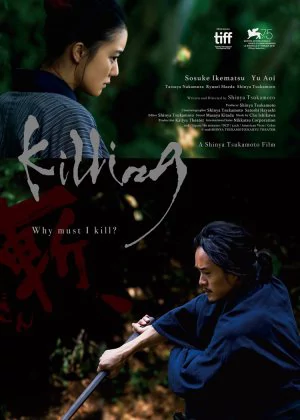Killing

Over the last decade, Shinya Tsukamoto's output has been slowing down noticeably. His previous film already dates back to 2014, making this the largest gap between any of his releases yet. Tsukamoto himself is getting a little older of course, luckily his love for film hasn't died down just yet. Killing [Zan] may be a bit more toned down compared to his earlier work, but it's still 200% vintage Tsukamoto. It's the kind of film you can't really find with any other director, but it might also be the film that prepares his fans for a Tsukamoto-less future.
![screen capture of Killing [Zan]](/thumbs/img/articles/1200xauto/killing-2018-1.webp)
This is Tsukamoto's first film outside a (relatively) contemporary setting. He did previously direct Gemini (based on an Edogawa Ranpo story), but that was still situated in the 20th century. Killing is a full-on samurai narrative set during the Edo period. It takes a little getting used to, especially knowing that Tsukamoto didn't really adapt his visual approach to the subject matter, but apart from a small stylistic shock at the very start, things fell into place very quickly. Depending on how much you like Tsukamoto's style and how attached you are to more traditional samurai narratives though, your mileage may vary.
Samurai films tend to be quite plot-focused, but Tsukamoto doesn't really care about genre conventions and sticks to what he knows best. While there are clear outlines of a plot present, the film's core themes quickly take center stage and dictate the film's direction. Killing is an exploration of its title, with characters facing the act of murder in different contexts and circumstances, sometimes as the hero, at other times as the villain, or simply as humans with reasons to kill. The plot is purely subordinate to the themes, which is a clear warning for those expecting a simple narrative.
The film follows Mokunoshin, a ronin who settled down with a couple of farmers in order to protect their little commune. Things start to go awry when Sawamura, an older samurai, visits the town and plans to recruit Mokunoshin to join his squad in the Edo war. At the same time, a gang of hoodlums takes camp in the vicinity, upsetting the farmers' peaceful routines. Trying to prove the commune a favor, Sawamura pays the hoodlums a little visit, which inadvertently sets a series of lethal events in motion.
![screen capture of Killing [Zan]](/thumbs/img/articles/1200xauto/killing-2018-2.webp)
Visually this film is vintage Tsukamoto. Not quite as hectic or as energetic as his early work, but a restless and very mobile camera, sharp and meticulous editing and an eye for capturing beauty within madness make it hard to mistake Killing for a film coming from anyone else. Tsukamoto makes the best of his woodland surroundings, keeps the camera close to his characters and lends the appropriate energy to the action scenes. It's obvious that he isn't getting any younger, but he's still a madman when he gets behind the camera.
Of course the music is equally important in Tsukamoto's work. Don't expect any loud, discomforting tracks or industrial influences this time around, instead the soundtrack is more in line with the film's setting. The music supports the different scenes directly, ranging from moody upbeat pieces during the action scenes to more ethereal sounding music for the dramatic and introspective moments. The quality of the music is well above par too, bearing enough individuality to stand on its own while giving the film plenty of character in the process.
Tsukamoto himself picks up one of the lead roles, which is always a delight. Through the years he's really grown as an actor, though it's Sôsuke Ikematsu and Yû Aoi who put in the best performances here. I was quite surprised to see Aoi appear in a Tsukamoto film, but she's one of the best actresses working in Japan today, and she easily holds her own between the men. The secondary cast is decent too, although they don't have that much work.
![screen capture of Killing [Zan]](/thumbs/img/articles/1200xauto/killing-2018-3.webp)
Killing is pretty short and to the point, which is a trait that most Tsukamoto films share. The first half of the film is spent on character introductions and a few minor plot twists, the rest of the film works up to a pretty self-contained and focused finale that still feels incredibly epic. It's here that the film really shines, as the ending works both as a thorough exploration of the film's themes, as well as a pure genre exercise. It's a balance few directors ever get right, but it's something I've come to expect from Tsukamoto's films and it's nice to see he hasn't lost that skill just yet.
People yearning for the mad and zany Tsukamoto of yonder might be a little disappointed with Killing, then again they've probably lost track of his work for a decade or so. Killing is very much in line with Tsukamoto's more recent work. A little more subdued and in control, slightly more accessible, but in its own way still very punk, very pure and completely unique. It may not be an essential Tsukamoto, but it's a definite recommend that should be top priority for all who like to keep a close watch on Asian cinema.